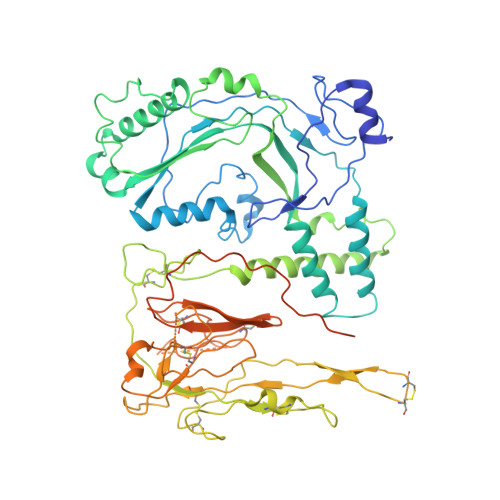The cryo-EM structure of the acid activatable pore-forming immune effector Macrophage-expressed gene 1.
Pang, S.S., Bayly-Jones, C., Radjainia, M., Spicer, B.A., Law, R.H.P., Hodel, A.W., Parsons, E.S., Ekkel, S.M., Conroy, P.J., Ramm, G., Venugopal, H., Bird, P.I., Hoogenboom, B.W., Voskoboinik, I., Gambin, Y., Sierecki, E., Dunstone, M.A., Whisstock, J.C.(2019) Nat Commun 10: 4288-4288
- PubMed: 31537793
- DOI: https://doi.org/10.1038/s41467-019-12279-2
- Primary Citation of Related Structures:
6U23, 6U2J, 6U2K, 6U2L, 6U2W - PubMed Abstract:
Macrophage-expressed gene 1 (MPEG1/Perforin-2) is a perforin-like protein that functions within the phagolysosome to damage engulfed microbes. MPEG1 is thought to form pores in target membranes, however, its mode of action remains unknown. We use cryo-Electron Microscopy (cryo-EM) to determine the 2.4 Å structure of a hexadecameric assembly of MPEG1 that displays the expected features of a soluble prepore complex. We further discover that MPEG1 prepore-like assemblies can be induced to perforate membranes through acidification, such as would occur within maturing phagolysosomes. We next solve the 3.6 Å cryo-EM structure of MPEG1 in complex with liposomes. These data reveal that a multi-vesicular body of 12 kDa (MVB12)-associated β-prism (MABP) domain binds membranes such that the pore-forming machinery of MPEG1 is oriented away from the bound membrane. This unexpected mechanism of membrane interaction suggests that MPEG1 remains bound to the phagolysosome membrane while simultaneously forming pores in engulfed bacterial targets.
Organizational Affiliation:
ARC Centre of Excellence in Advanced Molecular Imaging, Monash University, Melbourne, VIC, 3800, Australia.















